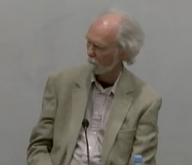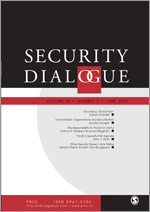
International security is a term which refers to the measures taken by states and international organizations, such as the United Nations, European Union, and others, to ensure mutual survival and safety. These measures include military action and diplomatic agreements such as treaties and conventions. International and national security are invariably linked. International security is national security or state security in the global arena.
Environmental security examines threats posed by environmental events and trends to individuals, communities or nations. It may focus on the impact of human conflict and international relations on the environment, or on how environmental problems cross state borders.

Barry Gordon Buzan, FBA, FAcSS is a British political scientist. He is an Emeritus Professor of International Relations at the London School of Economics and a honorary professor at the University of Copenhagen and Jilin University. Until 2012 he was Montague Burton Professor of International Relations at the LSE. Buzan sketched the Regional Security Complex Theory and is therefore together with Ole Wæver a central figure of the Copenhagen School.
Ole Wæver is a professor of international relations at the Department of Political Science, University of Copenhagen. He has published extensively in the field of international relations, and is one of the main architects of the Copenhagen School in International Relations.
Securitization in international relations and national politics is the process of state actors transforming subjects from regular political issues into matters of "security": thus enabling extraordinary means to be used in the name of security. Issues that become securitized do not necessarily represent issues that are essential to the objective survival of a state, but rather represent issues where someone was successful in constructing an issue into an existential problem.
The Copenhagen School is a term given to "schools" of theory originating in Copenhagen, Denmark. In at least four different scientific disciplines a theoretical approach originating in Copenhagen has been so influential that they have been dubbed "the Copenhagen School"
Maritime security is an umbrella term informed to classify issues in the maritime domain that are often related to national security, marine environment, economic development, and human security. This includes the world's oceans but also regional seas, territorial waters, rivers and ports, where seas act as a “stage for geopolitical power projection, interstate warfare or militarized disputes, as a source of specific threats such as piracy, or as a connector between states that enables various phenomena from colonialism to globalization”. The theoretical concept of maritime security has evolved from a narrow perspective of national naval power projection towards a buzzword that incorporates many interconnected sub-fields. The definition of the term maritime security varies and while no internationally agreed definition exists, the term has often been used to describe both existing, and new regional and international challenges to the maritime domain. The buzzword character enables international actors to discuss these new challenges without the need to define every potentially contested aspect of it. Maritime security is of increasing concern to the global shipping industry, where there are a wide range of security threats and challenges. Some of the practical issues clustered under the term of maritime security include crimes such as piracy, armed robbery at sea, trafficking of people and illicit goods, illegal fishing or marine pollution. War, warlike activity, maritime terrorism and interstate rivalry are also maritime security concerns.
The Copenhagen Peace Research Institute (COPRI) was a Danish research institute established in 1985 by the Danish Parliament. Its aim was to support and strengthen multidisciplinary research on peace and security. Established as an independent institute, in 1996 it became a government research institute under the Ministry of Research and Information Technology. In January 2003, COPRI was merged into the Danish Institute for International Studies.
Thomas Diez is a German professor of Political Science and International Relations at the Institute for Political Science, University of Tübingen. He was formerly Professor of International Relations Theory in the Department of Political Science and International Studies at the University of Birmingham, where he was Head of department from 2005 to 2008. Diez earned his PhD at the University of Mannheim. He was formerly a Research Fellow at the Copenhagen Peace Research Institute where he worked with Barry Buzan and Ole Waever. He studies international relations theory, European integration and conflict transformation and is best known for his contributions to the debate on the European Union's normative power. Books he has edited or co-edited include The EU and the Cyprus Conflict: Modern Conflict, Postmodern Union, European Integration Theory and The European Union and Border Conflicts, Cyprus: A Conflict at the Crossroads and An Introduction to International Relations Theory: Perspectives and Themes.
Jacobus Hubertus "Jaap" de Wilde is a Dutch academic. A native of Zuidlaren, he has been a Professor of International Relations and Security Studies at the University of Groningen since 2007. He headed the department of International Relations between 2008 and 2012. From 2001 to 2007 he was professor in European Security Studies at the Department of Political Sciences, VU University Amsterdam, and from 1995–2007 he was senior research fellow in European Studies and IR Theory at the Centre for European Studies (CES), University of Twente. From 1993–1995 he worked at the Copenhagen Peace Research Institute (COPRI).

Security Dialogue is a peer-reviewed academic journal that publishes scholarly articles which combine contemporary theoretical analysis with challenges to public policy across a wide-ranging field of security studies. The journal is owned by the Peace Research Institute Oslo which also hosts the editorial office. As of 1 October 2015 Mark B. Salter is the editor-in-chief. Marit Moe-Pryce has been the managing editor of the journal since 2004. Current associate editors are Emily Gilbert, Jairus V. Grove, Jana Hönke, Doerthe Rosenow, Anna Stavrianakis, and Maria Stern.

Security: A New Framework for Analysis is a book by Barry Buzan, Ole Wæver and Jaap de Wilde. It is considered to be the leading text outlining the views of the Copenhagen School of security studies. The work addresses two important conceptual developments: Buzan's notion of sectoral analysis and Ole Wæver's concept of 'securitization'. The book advocates for an intersubjective conceptualization of security, positing that the understanding of security should be broadened beyond its traditional scope. It contends that security should encompass a wider array of issues, such as environmental threats and challenges to societal identities.
Identity, Migration and the New Security Agenda in Europe is a 1993 book by Ole Wæver, Barry Buzan, Morten Kelstrup and Pierre Lemaitre. The work is significant to the Copenhagen School of security studies as an early collaboration between Ole Waever and Barry Buzan and for weakening the state-centrism of early securitization theory.
Regions and Powers: The Structure of International Security is a 2003 book by Barry Buzan and Ole Waever. The book discusses the Copenhagen School's approach to sectoral security.
Societal security is a concept developed by the Copenhagen School of security studies that focuses on the ability of a society to persist in its essential character. It was developed in 1990s in the context of the end of the Cold War and moves towards further integration in the European Union. This paradigm de-emphasizes the role of state power in guaranteeing security by confronting threats, highlighting instead questions of community identity and social dynamics.

The European Security Order Recast: Scenarios for the Post-Cold War Era was a 1990 international relations book by Barry Buzan, Morten Kelstrup, Pierre Lemaitre, Elzbieta Tromer and Ole Waever. The book focused on structural transformations in European security at the end of the Cold War and argues that concerns about traditional military security would decrease and that the issue of societal security would become more important in the future. The work is considered to be belong to the Copenhagen School of security studies.
Regional security complex theory (RSCT) is a theory of international relations developed by Barry Buzan and Ole Wæver and advanced in their 2003 work Regions and Powers: The Structure of International Security. Buzan and Wæver are perhaps best known as the key figures behind the influential Copenhagen School of security studies, in which the main principle is examining security as a social construct (see also securitization and constructivism).
International political sociology (IPS) is an interdisciplinary field and set of approaches at the crossroads of international relations theory and other disciplines such as sociology, geography and anthropology. It is structured around initiatives such as the journal International Political Sociology and the network Doingips, as well as scholars such as Didier Bigo, Anastassia Tsoukala, Ayse Ceyhan or Elspeth Guild.

Amitav Acharya is a scholar and author, who is Distinguished Professor of International Relations at American University, Washington, D.C., where he holds the UNESCO Chair in Transnational Challenges and Governance at the School of International Service, and serves as the chair of the ASEAN Studies Initiative. Acharya has expertise in and has made contributions to a wide range of topics in International Relations, including constructivism, ASEAN and Asian regionalism, and Global International Relations. He became the first non-Western President of the International Studies Association when he was elected to the post for 2014–15.

Ethnic Identity and the State in Iran is a 2013 book by Alam Saleh in which the author examines inter-ethnic tension and the politicization of ethnic identity in Iran. He suggests that problems with ethnicity and nationality in Iran, as in other countries of the Middle East, has not been so much the result of ethnic identity formation, but the product of the securitization of ethnic issues. The book has received positive reviews in the Middle East Journal, Review of Middle East Studies, the British Journal of Middle Eastern Studies, and Nations and Nationalism.





